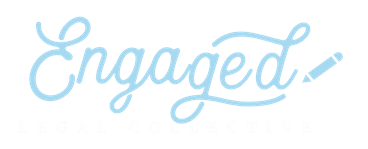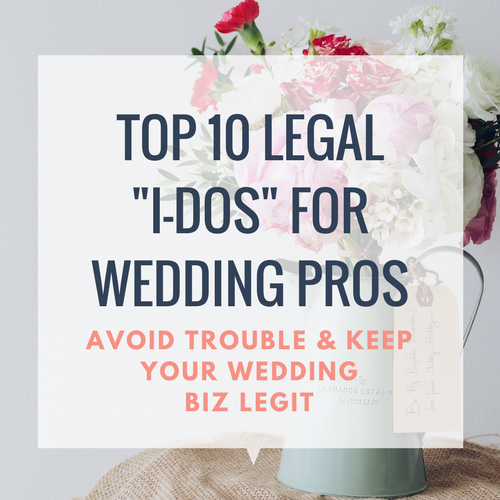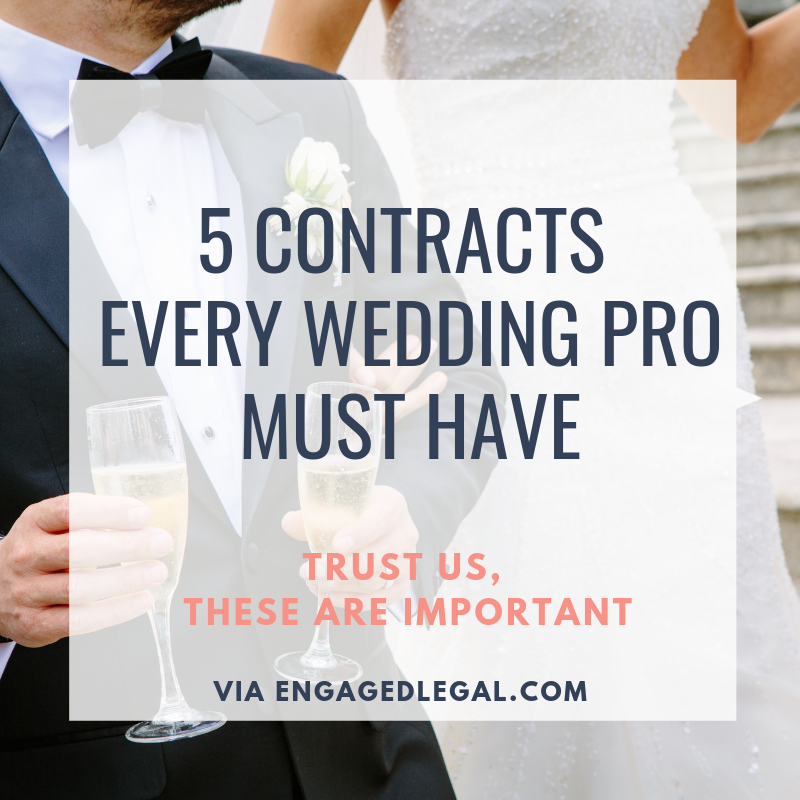Copyright for Wedding Pros 101: The Basics (Plus One Pro Tip You Can't Miss)
/There’s a lot of chatter about copyright law recently with the launch of the new “small claims” copyright court.
But I’ve found that small business owners are just as confused as ever about the nuts and bolts of copyright law.
And honestly, it’s a COMPLICATED subject— so I can’t blame you! The U.S. Code doesn’t make it easy, and the constant updates to caselaw make it an absolute headache to follow. But that’s why you’ve got nerds like me who LOVE this stuff 🤓
Let’s strip it all down and start from square one just to make sure we’re all on the same page.
What is copyright?
A copyright is a specific set of rights you get for creating something original and “fixing” it in a “tangible medium.” Copyright law applies to a LOT of different types of works, including photographs, paintings, illustrations, computer programs, musical compositions, sound recordings, books, poems, blog posts, movies, architectural works, plays, website copy, or any other original text.
Copyright law specifically includes the following exclusive rights, meaning you, the author, have the SOLE right to:
Reproduce the work in copies or “phonorecords" (a sound recording for those of use born after 1950).
Prepare “derivative works” based upon the work. A derivative work is something that uses the underlying creative material to make a new work— think the play “Harry Potter and the Cursed Child” from the OG “Harry Potter” series. That’s a derivative.
Distribute copies or phonorecords of the work to the public by sale or other transfer of ownership or by rental, lease, or lending. E.g.: Make copies and give them to people.
Perform the work publicly if it is a literary, musical, dramatic, or choreographic work; a pantomime; or a motion picture or other audiovisual work.
Display the work publicly if it is a literary, musical, dramatic, or choreographic work; a pantomime; or a pictorial, graphic, or sculptural work. This right also applies to the individual images of a motion picture or other audiovisual work. Real world example: Showing a movie at a theater, displaying photographs at a gallery, or performing a choreographed piece. If the author didn’t give permission for you to do those things, you’re violating this right and infringing.
Perform the work publicly by means of a digital audio transmission if the work is a sound recording. E.g.: Radio, streaming, etc. (This gets wonky because of the music industry lobby, but let’s keep it simple).
The catch here is that in the US as of 2019, works must be registered to sue under copyright law. But you can register a work post-infringement (you’ll just get pennies on the dollar that you’d have gotten if the work was registered before the infringement).
What is a “work?”
A “work” is something independently created by a human author and put into a “tangible” medium. This means it’s not just an idea— it has to be reduced to writing, recorded, encoded, or otherwise put into a physical form.
Who owns the copyright in a work?
The author! That’s easy!
Just kidding. It’s not that easy.
Typically, in MOST situations, the author is the person who “fixed” the work into the tangible medium. This could be:
The photographer who clicked the shutter button
The event planner who created a binder full of charts, lists, written documents, and other useful information for couples
A designer who created a mood board and furniture design for an event space by drawing it out by hand or computer
It’s the person who MAKES the THING.
BUT…. there’s also “Works Made For Hire.” This is where things get interesting.
With a “Work Made for Hire,” the employer or commissioner of the work is considered the author. Works will be considered a “work made for hire” if they fall into one of two categories, which are defined by statute (law). First, the parties must expressly agree in a written instrument signed by them that the work is to be considered a work made for hire, AND either:
the work is prepared by an employee within the scope of his or her employment (note: NOT independent contractor!) or
the work is specially ordered or commissioned for use
as a contribution to a collective work,
as a part of a motion picture or other audiovisual work,
as a translation,
as a supplementary work,
as a compilation,
as an instructional text,
as a test,
as answer material for a test, or
as an atlas.
Moral of the story: Something isn’t a Work Made for Hire just because you say it is! A lot of times, folks think throwing in “Work Made for Hire” is a "catch all," and it isn't.
How are copyright laws enforced?
Copyright laws are enforced by the copyright holders.
There are both civil and criminal penalties for violating copyright laws. Typically, you’re going to be looking at the civil penalties, but everyone is familiar with that “FBI NOTICE” that plays at the beginning of a DVD…
If you violate someone’s copyright rights, you can be sued for “Damages,” aka 💸money.💸
Depending on if their copyright was registered, you can be liable for
Compensatory/ Actual damages (how much money you would have made if the infringer had properly licensed the copyright)
Disgorgement of Profits, meaning any profits the infringer made would be transferred to the copyright holder
Statutory Damages of up to $150,000 per infringement, per work (those “big money” damages we hear about)
Attorneys fees, which can be cost prohibitive for many small businesses (and why you should always register your copyrights— you want to be able to get these back!)
Claims are brought in federal court or the new “small claims” copyright court.
Pro Tip: Assume anything on the Internet is subject to copyright laws
Here’s a pro tip: Go ahead and assume that if it’s on the internet, it falls under copyright law.
Think about it this way: a copyright lasts for life of the author + 70 years. The internet hasn’t been around for 70 years.
SOMEONE had to scan/ photograph/ draw/ type/ re-record/ create the works you’re seeing on the internet, even if the underlying work is in the public domain / has an expired copyright. The creator of the photograph/ scan/ re-record/ type/ translate the work you’re reading most likely created a new work when they made that digital photograph/ recording/ writing that got uploaded to the internet (all it takes is a “modicum” of creativity to create something that can be protected under copyright law). In order to steer clear of issues with copyright law, just go ahead and assume that everything you’re seeing online is subject to a current copyright claim of right.
Did you know all of these? Look at you go!!
Dive deeper and check out part 2: “The Top Copyright Myths Wedding Pros NEED to Know” —>




















